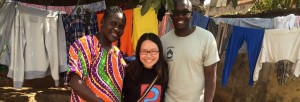
On my first weekend in Nairobi, I had the opportunity of visiting one of the largest slums in Africa – Kibera. Kibera is a sprawling urban jungle of shanty-town housing in Nairobi. Cramped alleyways and mishmash structures lean into and grow out of each other. Kibera – meaning “forest” in Nubian – houses an estimated population of0.5 to 1 million people, with the majority of this population living in extreme poverty. According to local aid workers, Kibera is home to one pit toilet for every 100 people. Its inhabitants suffer from an HIV/AIDS infection rate of more than 20% and 4 out of every 5 people living here are unemployed.
The original settlers were the Nubian soldiers from the Kenyan and Sudanese border, with plots given to soldiers as a reward for service in WWI. Since independence in 1963, housing in Kibera was rendered illegal by the government. But the new legislation inadvertently allowed the Nubians to rent out their property to a greater number of tenants than legally permitted and, for poorer tenants, Kibera was perceived as affordable despite the questionable legalities.
Through connections with Spur Afrika in Australia, I had the great opportunity of meeting their Kenyan directors – Patrick. Spur Afrika is a locally run Kenyan charity which focuses on liberating children and youth from the vicious cycle of social effects such as poverty, drug abuse and crime in Kibera slums. Spur Afrika believes in providing young lives with mentoring, education and skill development in order to alleviate poverty. I had the privilege of meeting some of the children whose schooling was sponsored by Spur Afrika. “I want to be a pilot when I grow up,” young Jessica from Kibera told me. This young girl had run long distance through this sprawling, ramshackle settlement to greet us with the brightest smile. She was happy to see us.
Patrick is a bright young man who spoke perfect English, carries himself with neat smart clothing and an easy sense of humor – none of which resonated with what I knew about Kibera. Patrick grew up in the neighborhood of Kibera and continues to serve the community there with great love and passion. A conversation with Patrick and a trip to Kibera has shifted my perception of this slum entirely and those living there.For some reason, as foreigners from developed country, we’re often fascinated in documenting the tragedies in these slums and trying to solve their problems using our own ways. It is easy to romanticize poverty, to see people as inherently lacking agency and will. It is easy to strip them of human dignity, to reduce them to objects of pity. But my lesson learnt from Kibera is asMother Teresa once said: “The poor give us much more than we give them. They’re such strong people, living day to day with no food. And they never curse, never complain. We don’t have to give them pity or sympathy. We have so much to learn from them.”